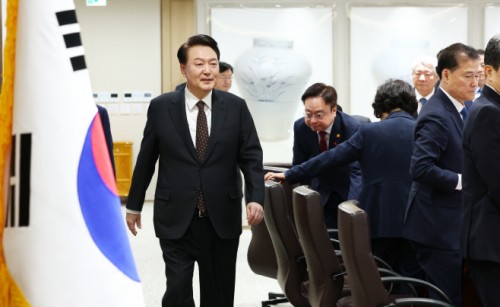 |
| President Yoon Suk-yeol enters to attend a Cabinet meeting at the presidential office in Seoul on Jan. 16, 2024./ Source: Yonhap News |
By AsiaToday reporter Hong Sun-mi
President Yoon Suk-yeol criticized North Korean leader Kim Jong-un on Tuesday for defining inter-Korean relations as those between “two hostile” nations, saying that it amounted to an acknowledgement of the regime’s nature as an “anti-national and anti-historical group.”
“The North Korean authorities defined the inter-Korean relations as those between two hostile nations, not a fratricidal relation,” Yoon said during a Cabinet meeting. It is the first time that President Yoon has sent a warning message to the North since the New Year.
The North Korean leader called the Republic of Korea a “hostile belligerent” during a plenary session of the Workers’ Party on Dec. 30 last year, and declared a fundamental revision of its stance towards South Korea. On Monday, Kim ordered to regard South Korea as its “primary foe and invariable principal enemy,” saying, “The expressions ‘northern half’ and ‘independent, peaceful unification, and great national unity’ in our constitution should now be deleted.”
In response, President Yoon warned against North Korea’s artillery firing and ballistic missile launches near the Northern Limit Line (NLL), which began in the New Year.
“Should North Korea provoke us, we will punish them multiple times as hard,” Yoon said. “The conventional disguised peace tactic that threatens with a choice between war and peace will not work anymore,” he said.
Yoon also called for speedy measures to revive the economy of people’s livelihoods in South Korea.
He requested for the National Assembly to pass a bill aimed at extending a grace period on enforcement of the Serious Accidents Punishment Act, which from January 27 will expand to include businesses with fewer than 50 employees.
“I can’t agree more that the safety of workers is important, but punishing is not the best solution,” he said. “More time should be allowed in consideration of the realistic situations faced by small- to medium-sized enterprises.”
Yoon also ordered the Ministry of Strategy and Finance to fully overhaul 91 charges that the government collects as “quasi-taxation.” According to the Framework Act on the Management of Charges, charges refer to financial obligations other than taxes such as share of expenses, dues and contributions the heads of central administrative agencies and local governments impose for public benefit projects. It was introduced in 1961, and is operated by 18 ministries as of the end of 2023. The government collected 22.4 trillion won (US$16.83 billion) of charges from 90 items as of 2022.
“To alleviate the burden on the public and businesses, we need to launch a full-scale review on 91 items of charges and reappraise them from the bottom up,” Yoon said. “Charges are imposed for exceptional cases that incur social costs. It should not be overused for the purpose of financing.”
#Yoon Suk-yeol #North Korea
Copyright by Asiatoday
Most Read
-
1
-
2
-
3
-
4
-
5
-
6
-
7





















